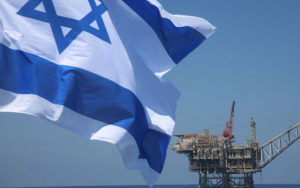In a move aimed at increasing competition in the Israeli electricity sector, Greek developer Energean Oil & Gas has secured its first gas supply deals for Israel’s Karish and Tanin reservoirs.
The company’s subsidiary cIsrael, which intends to begin providing gas to the domestic market by 2020, has signed agreements with independent power provider Dalia Power Energies and its sister company Or Power Energies. The two firms will be purchasing an overall amount of up to 23 billion cubic meters (bcm) of gas to operate the Dalia power plant – Israel’s largest private power station – as well as future such facilities to be built by Or, the partners announced on Sunday.
“This is a significant day for the Israeli gas market,” said Mathios Rigas, chairman and CEO of Energean Oil & Gas. “These are the first contracts for gas supplies from the Karish and Tanin fields signed with the Dalia group, the largest private power producer in Israel. The agreement is a substantial step towards bringing competition and cheaper energy to the market for the benefit of Israeli consumers and the country’s economy.”
Located in the north of Israel’s exclusive economic zone, the Karish and Tanin reservoirs jointly contain about 58.7 bcm of gas and 14.3 million barrels of condensate in contingent resources – those that have been discovered but not yet commercially developed. In addition to these quantities are prospective resources with high chances of success, including approximately 25.6 bcm of gas and an additional 4.3 million barrels of condensate.
After receiving the Israel Petroleum Council’s approval in December, Energean purchased the two gas reservoirs from the Delek Group in a $148 million deal, originally cemented in mid-August.
“Energean is in talks regarding further contracts with other potential customers in the market and is aiming to submit a field development plan for the Karish and Tanin project in the next few weeks,” Rigas said.
As far as the current deals are concerned, the period of the supply agreements will begin from the date natural gas flows in commercial volumes from Karish and Tanin to the purchasers, and conclude at the point when their generation licenses need to be extended, according to the partners. The purchases have agreed to a “take-or-pay” arrangement for a minimum annual amount of gas, with the price linked to Israeli electricity markets and underpinned by a floor price, they said.
“Dalia and Or Energy are working to expand the volume of production offered by them while continuing to reduce the price of electricity,” said Eitan Meir, CEO of Dalia Power Energies. “We are pleased to sign the agreement that expands the gas sources and the ability of the companies to offer their customers electricity at a competitive price. Competition in all segments of the electricity sector will serve the public and the Israeli economy.”
National Infrastructure, Energy and Water Minister Yuval Steinitz praised the signing of these deals as a step forward in shattering the existing monopoly in the country’s natural gas sector. In part, he attributed this success to the advancement of the country’s controversial “natural gas outline” – a document approved last year to ensure competition and stability in the industry.
“The agreement is an important milestone in breaking the monopoly, with the entry of new players into the energy market of the State of Israel,” Steinitz said. “The agreement is the direct result of the implementation of the gas outline and the government decision about two months ago to encourage the development of small reservoirs. This will lead to increased competition in the field of natural gas in Israel, while lowering prices.”
Ask me anything
Explore related questions





